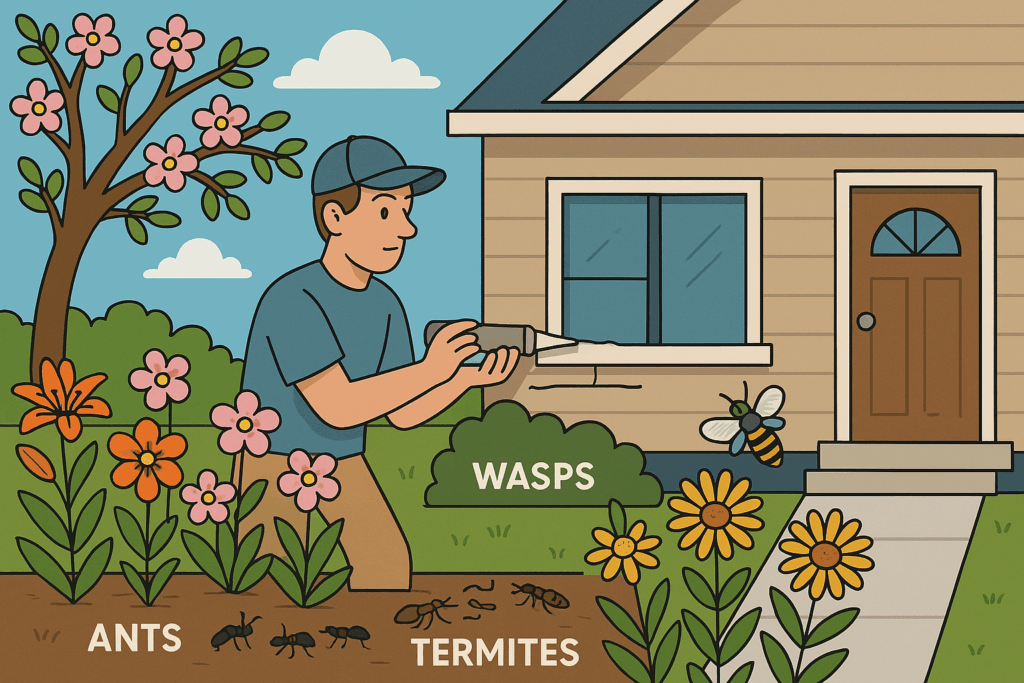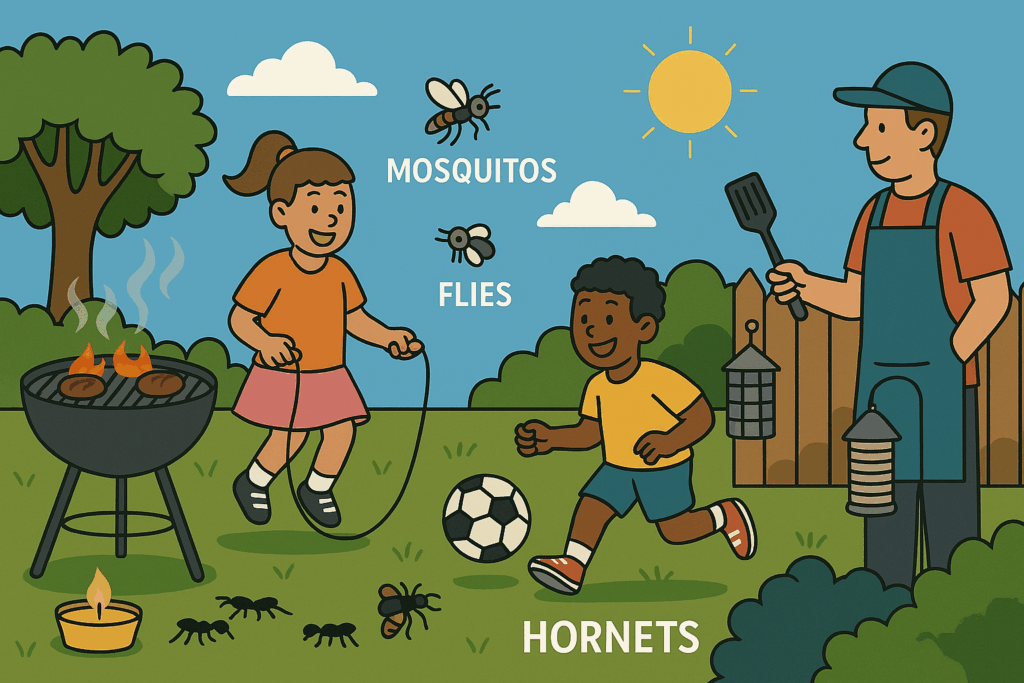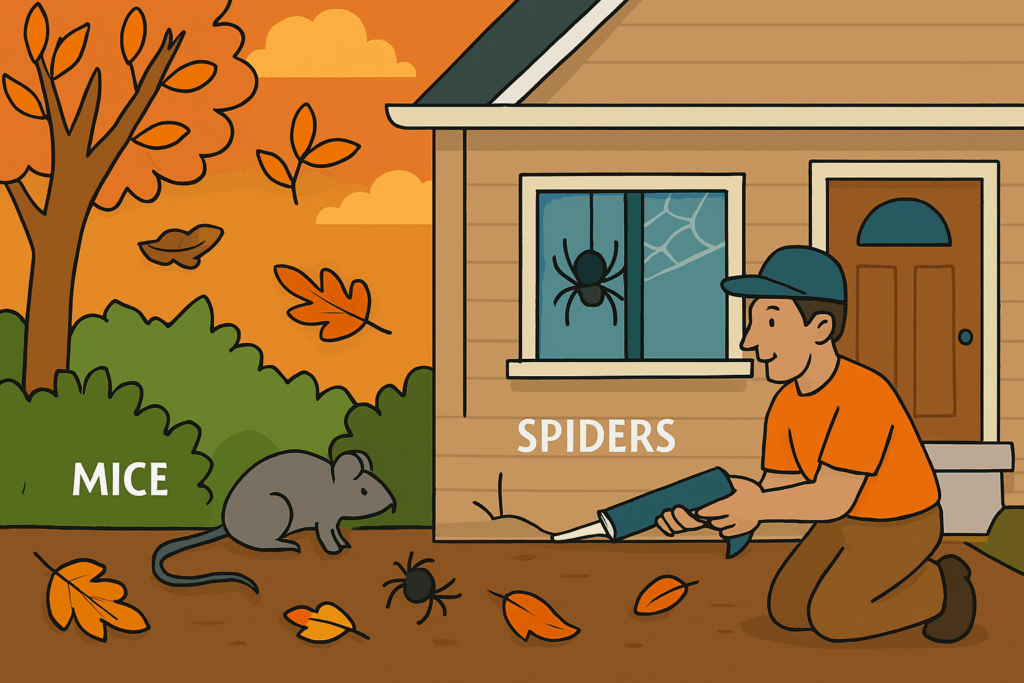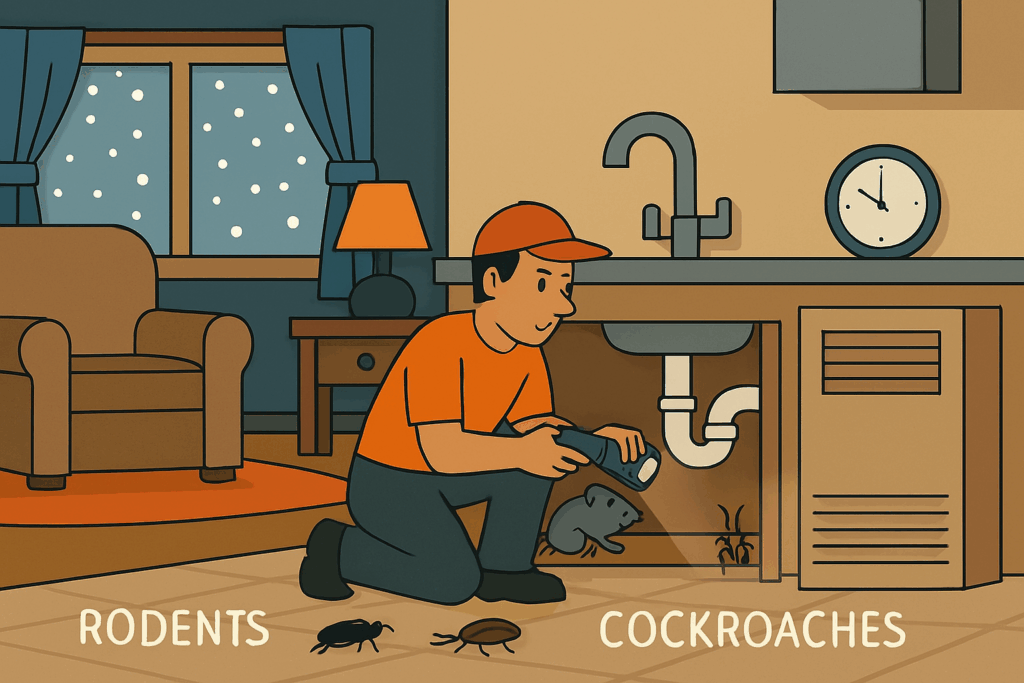
1. Introduction to Seasonal Pest Control
Pests love change. Not the emotional kind, but seasonal changes. As the temperature and humidity shift, so do their habits—and where they hide. That’s where seasonal pest control comes in.
What is Seasonal Pest Control?
Seasonal pest control is a year-round strategy. It involves adjusting your prevention and treatment based on the time of year. Instead of reacting to infestations, you prepare in advance. It’s proactive. Like switching to winter tires before the first snow.
Why Pests Vary With Seasons
Every season creates different conditions:
- Spring: Warmth wakes pests up. Insects begin breeding.
- Summer: Food is abundant. So are bugs.
- Fall: Pests start looking for warmth inside.
- Winter: Rodents move in, and hidden bugs thrive indoors.
Think of it as a game of hide and seek. You need to block hiding spots before the pests get comfortable.
Common Seasonal Pests in Canada
Here’s a seasonal snapshot:
Spring: Ants, termites, spiders
Summer: Wasps, mosquitoes, fruit flies
Fall: Mice, rats, boxelder bugs
Winter: Cockroaches, silverfish, rodents
Each pest has its moment to shine (and annoy). So your pest control strategy should change too.
Benefits of Following a Seasonal Plan
- Less damage: Catch them early.
- Fewer chemicals: Preventive work needs less treatment.
- Peace of mind: You won’t have to panic over surprise infestations.
And let’s be honest—nobody wants ants in their cereal or spiders in their socks.
2. Spring Pest Control Tips

Spring brings flowers, sunshine, and unfortunately—pests waking up from their winter naps.
Most Common Pests in Spring
Insects love spring. It’s the breeding season for many of them.
- Ants start forming new colonies.
- Termites begin their swarming season.
- Spiders become more active indoors.
- Bees begin nesting in yards and attics.
Inspection and Early Prevention Strategies
Walk around your house and:
- Check for cracks in the foundation.
- Look for ant trails near windows or baseboards.
- Inspect wood for signs of termites (mud tubes or soft spots).
Use this rule: if it’s a hole or gap, assume a bug will use it.
Safe Outdoor Pest Barrier Methods
Use natural or pet-safe sprays around:
- Doors and windows
- Foundation walls
- Garage entrances
Consider laying diatomaceous earth near entry points. It’s safe for people, deadly for bugs.
Spring Cleaning for Pest Control
This is the real reason for spring cleaning:
- Vacuum baseboards and under furniture.
- Declutter closets (less hiding space).
- Clean out attics and basements.
Spring Checklist:
- Seal food in containers
- Trim plants touching the house
- Clean gutters and downspouts
- Fix any leaking faucets
3. Summer Pest Control Tips

Ah, summer. Long days, short nights, and a parade of flying insects.
Summer-Specific Pest Threats
Summer’s heat brings out the worst offenders:
- Mosquitoes breed in standing water.
- Wasps get aggressive by July.
- Ants raid kitchens.
- Fleas and ticks bother pets and people.
Tips to Control Outdoor Pests
Some solid outdoor habits include:
- Dump standing water in flowerpots.
- Use citronella candles or torches.
- Set up wasp traps away from sitting areas.
- Mow the lawn regularly.
And keep trash bins sealed tight like Fort Knox.
Managing Food-Related Pests
Love BBQs? So do flies, ants, and raccoons.
Here are some simple tips to keep them away:
- Use food covers and mesh tents
- Wipe surfaces quickly after use
- Never leave food out overnight
- Rinse out bottles before throwing them away
Your garbage can smells like a buffet to pests.
Summer-Proofing Your Home
- Install door sweeps on exterior doors.
- Fix window screens with holes.
- Use essential oils like eucalyptus or peppermint indoors.
You can enjoy summer without swatting every five seconds.
4. Fall Pest Control Tips

Fall is cozy—but for pests, it’s move-in season.
Why Pests Move Indoors in Fall
Cool air tells pests to seek warmth. That usually means your home.
Expect activity from:
- Mice and rats
- Boxelder bugs
- Stink bugs
- Spiders
Checking and Sealing Entry Points
Your fall mission: seal every crack.
Here’s what you should do:
- Check around windows and doorframes
- Use weather-stripping and caulk
- Inspect roof vents and chimneys
- Screen all outdoor vents
If a pencil fits in a hole, a mouse can too.
Yard Maintenance and Pest Risks
Don’t let your yard invite rodents:
- Rake leaves and remove piles of wood.
- Keep compost bins sealed.
- Store firewood at least 20 feet away from your home.
Fall Pests to Watch Out For
- Rodents begin nesting indoors.
- Spiders follow prey inside.
- Beetles love cracks and crawlspaces.
Fall is the final call to act before winter hits.
5. Winter Pest Control Tips

You’d think pests vanish in the cold. Think again.
Winter Hiding Spots for Pests
They go where it’s warm and quiet:
- Behind appliances
- Inside walls
- In basements and attics
Rodent Prevention Strategies
Rodents chew wires, damage insulation, and multiply fast.
To stop them:
- Use steel wool to fill holes.
- Set traps near dark corners.
- Store food in sealed containers.
They don’t need a dinner invitation—they’ll find your snacks.
Dealing with Cockroaches and Bed Bugs
Winter makes indoor infestations worse:
- Cockroaches thrive in kitchens and laundry rooms.
- Bed bugs stay active in warm bedding.
Here are some important tips to keep your home clean and pest-free:
- Vacuum often and empty the vacuum outside
- Wash bedding in hot water
- Don’t ignore musty odors or strange stains
Importance of Indoor Sanitation
- Wipe counters before bed.
- Take trash out nightly.
- Avoid clutter, especially cardboard boxes.
Pests love crumbs and chaos.
6. Year-Round Pest Prevention Strategy
Seasonal pest control isn’t just about reacting — it’s about building habits that last all year. A little effort now saves a lot of headaches later.
Home Maintenance Checklist
Your house is your first line of defense. Here’s what you should do year-round:
- Inspect your home monthly: Look for cracks, leaks, or gaps in siding or foundation.
- Declutter regularly: Don’t give pests a place to hide.
- Fix leaks quickly: Pests love moisture more than we love coffee.
- Keep your home dry: Use dehumidifiers in basements and bathrooms.
Make it a routine—check while you clean.
Best Pest Control Habits by Season
Here’s a quick breakdown:
- Spring: Seal entry points, clean gutters, start preventative spraying.
- Summer: Remove standing water, clean up food waste, set up traps.
- Fall: Block crawl spaces, clean yard debris, rodent-proof attic.
- Winter: Deep clean kitchens, vacuum often, monitor rodent activity.
Simple tasks. Big impact.
When to Call Professionals
Sometimes, you need backup. Call a pest control expert when:
- Infestations repeat despite DIY efforts
- You spot nests or structural damage
- You hear movement in walls or ceilings
- Pest droppings appear daily
A professional has better tools—and better courage when facing nests of wasps.
Organic vs. Chemical Methods
Which is better? That depends on your needs:
Organic Pest Control:
- Uses essential oils and natural barriers
- Safer for kids, pets, and gardens
- May need frequent application
Chemical Pest Control:
- Powerful and long-lasting
- Good for severe infestations
- Should be handled carefully
Choose what fits your household and values. You can also mix both approaches.
7. Final Thoughts and Long-Term Planning
Let’s tie it all together like a neat bow on a holiday gift.
Summary of Seasonal Needs
Every season brings a different battle:
- Spring = Entry point prevention
- Summer = Outdoor pest control
- Fall = Indoor sealing and prep
- Winter = Sanitation and rodent defense
Follow the rhythm of nature. It’ll save you from nasty surprises.
Budgeting for Pest Control Year-Round
Professional help isn’t free—but it saves long-term repair costs.
Here’s an example of a pest control budget:
- Spring inspection: $100–$150
- Quarterly pest control package: $300–$500 per year
- DIY supplies: $50–$100 per season
Plan it like you would car maintenance. Prevent, don’t just patch.
Smart Tech and Gadgets for Pest Control
Yes, tech can help!
- Ultrasonic repellents: Keep rodents and bugs away using sound.
- Wi-Fi traps: Send alerts to your phone.
- Smart door sensors: Notify you of unwanted movement.
Home protection has gone digital—and it works!
Creating Your Own Seasonal Pest Control Calendar
Don’t just read this—plan with it. Make a simple calendar that includes:
- Monthly inspection reminders
- Seasonal deep clean weeks
- Quarterly pest treatment dates
- Yard and garden maintenance
Post it on your fridge, set reminders on your phone, or use a Google Calendar. Consistency wins the war.
Conclusion
Pest control isn’t a one-and-done deal. It’s a cycle—like the seasons.
If you stay ahead of the changes, pests won’t stand a chance. Whether it’s ants marching in spring, mosquitoes feasting in summer, or mice snuggling up in winter, your home can stay pest-free all year long.
You don’t need to become a pest control pro—you just need the right plan, and a little follow-through.
And hey, now you’ve got that plan.
FAQs
1. What is the best month to start pest control?
Start in early spring—March or April—before pests become active. Early treatment stops infestations before they grow.
2. Is pest control safe for pets and kids?
Yes, but always ask for eco-friendly or organic options. Many pros use pet-safe methods if requested.
3. Can I do pest control myself year-round?
Yes! Basic prevention (like sealing gaps and cleaning regularly) is very effective. But call a pro for serious problems.
4. Do all pests go away in winter?
Nope. Many pests just move indoors. Rodents, cockroaches, and silverfish are especially active in winter.
5. Are natural remedies as effective as chemical sprays?
For mild cases, yes. Essential oils, vinegar sprays, and traps can work well. For heavy infestations, chemicals may be needed.
